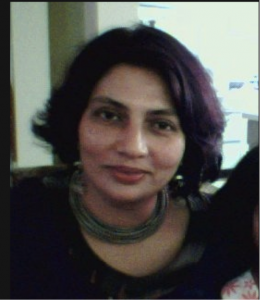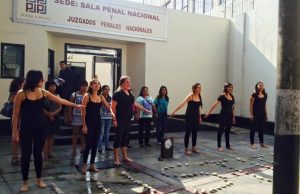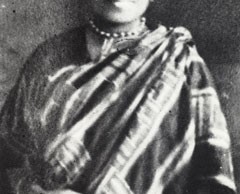Feminists We Love: Chandra Talpade Mohanty
 Chandra Talpade Mohanty (born in Mumbai India in 1955) is a postcolonial and transnational feminist theorist. She has degrees from University of Delhi and University of Illinois, Urbana-Champaign. As of 2013, she has served as the women’s studies department chair and professor of Women’s and Gender Studies, Sociology, and the Cultural Foundations of Education and Dean’s Professor of the Humanities at Syracuse University. Her work became internationally known after the publication of her influential essay, “Under Western Eyes: Feminist Scholarship and Colonial Discourses” in 1986. In this essay, Mohanty critiques the political project of Western feminism in its discursive construction of the category of the “Third World woman” as a hegemonic entity. Mohanty states that Western feminisms have tended to gloss over the differences between women of the global South, but that the experience of oppression is incredibly diverse, and contingent on geography, history, and culture. Her recent book, Feminism Without Borders: Decolonizing Theory, Practising Solidarity extends the argument of this essay and sets out an approach to transnational feminist collaboration.
Chandra Talpade Mohanty (born in Mumbai India in 1955) is a postcolonial and transnational feminist theorist. She has degrees from University of Delhi and University of Illinois, Urbana-Champaign. As of 2013, she has served as the women’s studies department chair and professor of Women’s and Gender Studies, Sociology, and the Cultural Foundations of Education and Dean’s Professor of the Humanities at Syracuse University. Her work became internationally known after the publication of her influential essay, “Under Western Eyes: Feminist Scholarship and Colonial Discourses” in 1986. In this essay, Mohanty critiques the political project of Western feminism in its discursive construction of the category of the “Third World woman” as a hegemonic entity. Mohanty states that Western feminisms have tended to gloss over the differences between women of the global South, but that the experience of oppression is incredibly diverse, and contingent on geography, history, and culture. Her recent book, Feminism Without Borders: Decolonizing Theory, Practising Solidarity extends the argument of this essay and sets out an approach to transnational feminist collaboration.
I came under Chandra Talpade Mohanty’s influence from the first day I read her work, and then had the chance to see her speak at a women of color conference in the 1980s. Her feminism was crystal clear, and clearly radical, and refreshingly rooted in the global south. While many of us were struggling to “do intersectionality”—to keep gender, race, class, sexuality, nationality, etc. in the same analysis—Chandra seemed to be doing it with ease. Even more importantly, Chandra was advancing the view that women from the global south needed to make alliances with US women of color, and vice versa. This was not always happening (and still isn’t), given that the categories of our identity shift between locations and priorities of struggle can shift as well. Sometimes women from the global south don’t identify with US Latinas or African American, Native American, and Asian American women; often, in the academy, class differences erode this potential alliance. And sometimes women of color in the US aren’t as knowledgeable about the neo-colonial world as we should be. Chandra’s life and work has spanned huge divides of experience, identity, and location to make real alliance possible, and productive.
TFW: Could you talk a little about your academic journey—how you came to be working in the academy, and why you chose the field you went into?
I am the first person in my extended family to get a Ph.D. and become a professor. No one in my immediate or extended family expected or encouraged this choice. I come from a middleclass, urban family of professionals. We talked about ideas but not about living the life of an intellectual, and this was perhaps the most difficult hurdle for me as a young feminist scholar—seeing myself as an intellectual, recognizing my own excitement and desire to engage with ideas that explained the contradictions of the social world I occupied. The only intellectual I remember from my childhood is a great-aunt who towered over most men (at 6 feet), and was respected (and feared) because she chose to be single and earn an independent living as a teacher and principal of a high school. I later learned Lanumavshi was transgender (a well-hidden fact in the family). But like her, the women in my extended family were/are smart, resilient and independent—my mother, for instance, went to night school and worked during the day to put my uncle through college after her father died. I believe I absorbed the strength and resilience of the women in my family—it has certainly helped me in the academy!
I learned very early in my intellectual journey that the best thinking and strategizing emerges through collaborations with diverse communities of people with similar commitments and vision of justice. I have worked to build these radical intellectual neighborhoods in the service of social justice. As a graduate student at University of Illinois, Urbana, I co-organized with Ann Russo, the Common Differences: Third World Women and Feminist Perspectives” conference in 1983—I believe this was the first or one of the first conferences of this scale to bring U.S. women of color and feminists from the “third world” into conversation about the “common differences” in our feminist praxis. This was the beginning of my intellectual journey in the company of feminists of color. Questions of intersectionality and relationality of structures of power and women’s place based resistance; the complexities of working across race, class, sexuality, and nationality in the context of multiple colonial legacies and imperial adventures of the USA; the centrality of economic issues, poverty, and class in envisioning and enacting gender justice; the significance of identity and community (who are the “we”?), and the theoretical and epistemological contributions of a decolonial feminist engagement were all issues that emerged from this collective space—and that have stayed with me through all the work I have done since then. The collection Third World Women and the Politics of Feminism is anchored in this conference.
As to my choice of a field, my Ph.D. is in education, but after the life-changing experience of the Common Differences conference, it was clear the field of women’s studies was where I was headed. For me the academy has always been a space of colonization and struggle and simultaneously a space of radical possibility and dissent in terms of creating oppositional communities and radical knowledge projects. The curricular, pedagogical, and institutional projects I have been privileged to participate in and sometimes initiate have been predicated on a deep belief in the role of the academy as a transformative space—and as an institution that plays a key role in addressing and redressing inequities of access, resources, social capital, and imagination. It is the place where I have found the deepest friendships and solidarities with visionary feminist scholar/activists, and where I believe I can continue to bring various parts of myself together in the most productive ways—as a teacher, a scholar, and social justice activist. None of this is easy—but it is deeply rewarding.
TFW: Could you talk a little about your groundbreaking essay, “Under Western Eyes,” that developed a sweeping critique of some of the common errors in the feminist theorizing coming out of the global north that is about women of the global south? I know you have written about this but it would be great to hear you talk more informally about what prompted this work, the reactions to it, and your assessment of its (mis)interpretations.
I wrote “Under Western Eyes” as an ABD (all–but-dissertation, almost finished graduate student), part-time lecturer in Women’s Studies at Cornell. I have always believed that the intellectual work we are passionate about is in some way connected to (but not identical with) our own biographies. My experience of a radical community of third world and women of color thinkers at the Common Differences conference made it clear that an anti-racist, anti-capitalist feminist community was possible in and outside the academy. However, my immediate move to Ithaca, and a part-time lectureship in an all-white Women’s Studies program highlighted the social contradictions of the field. While I was able to slowly create the anti-racist, transnational feminist community I was committed to in Ithaca, it remained at the margins of the institution.
As an avid reader of feminist theory, it was also evident that the “space” for immigrant, third world women (like myself) in western feminist theory was a truncated one. Pedagogically, “we” were present in courses on development and political economy, and theoretically, “we” often emerged as a foil to hegemonic white/western feminist subjectivities. As I began developing the arguments in “Under Western Eyes” I presented them in numerous feminist public venues, encountering disbelief and hostility from many of my senior colleagues at Cornell, and relief and recognition from postcolonial and US women of color. Given that I was in a precarious academic situation as an ABD, part-time lecturer, folks telling me I “should not dabble in feminist theory” had a powerful impact. Quite honestly, looking back, the experience of writing “Under Western Eyes” is key to the development of my understanding of the racialized politics of knowledge and of institutional power in U.S. feminist academic communities. This experience clarified my “outsider” status, simultaneously solidifying my commitment to anti-racist, materialist, anti-imperialist feminist theorizing. If powerful people were telling me to back off, I was of course going to plunge straight in!
I’ve written quite extensively about the reception and mis(readings) of the essay in “Under Western Eyes Revisited (2003),” and in “Transnational Feminist Crossings (2013),” so I won’t reiterate these ideas here. But suffice it to say that when I wrote “Under Western Eyes,” I had no sense that it would have the kind of impact in feminist scholarly/activist communities that it has had. I continue to be moved by emails from women across the world who have just read the essay and tell me about their experience of having the courage to name themselves a feminist for the first time.
TFW: Could you talk about your feminist commitments, and current projects, e.g. the new work on transnational feminist engagements?
Over the years, and ever since the experience of organizing the Common Differences Conference as a graduate student, my work has been deeply collaborative. Perhaps this is why I am so drawn to thinking about and enacting solidarity. I often say that I think best in the company of political comrades—in the academy and in community organizations. So working for over a decade with organizers at Grassroots Leadership of North Carolina and with the New York women’s collective Center for Immigrant Families taught me concrete lessons about solidarity, political education, and organizing around issues of privatization (of prisons and immigrant detention centers), and segregation of schools and immigrant women’s rights. And just as Third World Women and the Politics of Feminism (1991) grew out of the Common Differences gathering, Feminist Genealogies, Colonial Legacies, Democratic Futures (1997) had its genesis in the collective space, dialogue, and discomfort that characterized a retreat in the late 1980s at Blue Mountain Lake in the Adirondacks—the retreat, initiated by Barbara Smith, was about strategizing and building ‘The Women of Color Institute for Radical Research and Action.’ The Institute did not materialize but my over two decade collaboration with Jacqui Alexander began there—and Feminist Genealogies was inspired by that gathering in the mid 1980s. Jacqui and I continue to deepen our friendship and work together—I am hoping we can develop and extend some of the arguments in our recent “Cartographies of Knowledge and Power” (2010) into a book length study on transnational feminist theorizing.
I am working on two large projects at the moment. A book entitled Just Feminisms, Radical Knowledges, Insurgent Practices, that draws on my writing since the publication of Feminism Without Borders, (2003), and focuses especially on radical, anti-capitalist, anti-imperialist feminist struggles and the politics of knowledge in securitized/militarized, neoliberal, increasingly impoverished communities across national borders. The second large project is a collaboration with Linda Carty, my sister/colleague at Syracuse University, and draws on survey data from key anti-racist, anti-imperialist feminist scholar/activists from the Global South and North (including yourself Linda!) to create a collective mapping of transnational feminist engagements on the ground since the 1970s/80s. We are especially interested in how our respondents crafted and reflected on feminist realities on the ground—basically mapping how feminist knowledge production over the last few decades is connected to the place-based lived realities of feminist praxis. Our interlocutors come from Asia, South America, the Caribbean, North Africa, Europe, Canada, and North America, and most have histories of organizing and scholarship that date back to the 1970s, and 1980s. The data we have is very rich and can perhaps be the basis of a collective archive of feminist engagements—if we can figure out an appropriate format for this! Meanwhile, we have just written the first piece, “Mapping Transnational Feminist Engagements: Neoliberalism and the Politics of Solidarity.” I am really excited about this work since it draws on the political biographies and theoretical and strategic thinking of some amazing feminist scholar/activists whose work has collectively birthed feminist movements in 2013!
TFW: Could you talk a little about the US women of color / international women of color solidarity challenges and opportunities?
Since my entire feminist trajectory has involved building solidarities, alliances, and friendships between U.S. and international women of color perhaps a good place to start would be with a couple of examples of the challenges and opportunities I have encountered. My experience of the Common Differences conference in 1983 was instructive in that as a woman of color from the Global South, it was really important for me to understand the U.S. landscape of feminism from the epistemological standpoint of U.S. women of color. So while the politics of class/capitalism and decolonization provided a common locus of engagement, developing an anti-racist standpoint was key in forging solidarities with U.S. women of color. Similarly, my collaborations—scholarly, pedagogical, and activist, have always been with U.S. women of color with actively anti-nationalist, anti-imperialist feminist commitments. I guess what I am saying here is that there are abundant opportunities for solidarities between U.S. women of color and women of color from the Global South—but the success of these collaborations and alliances depends on a deep commitment to understanding the differences between our histories and experiences. And, in the current moment I would say challenges to solidarity lie in the way neoliberal economic and ideological practices normalize so-called post-race/post feminist consumer cultures such that there are significant generational differences between feminists who grew up in the cusp of the decolonization of the “third world”—the 1950s/60s and those who grew up in the 1990s/2000s. The challenges of solidarity work across borders lies in careful ethical engagement in social justice struggles from all of our different, interconnected locations. Thus, for instance, two of the contemporary struggles I am engaged in, immigrant rights and undocumented student struggles in the USA, and solidarity work on Palestine (the BDS—boycott, divestments, sanctions—movement) both require U.S. and international women of color (and of course antiracist, anti-imperialist white women and men) working across multiple borders analytically, and strategically. I believe U.S. and International women of color have much to learn from and contribute together to the analysis of immigrant rights/undocumented struggles (after all this is a struggle about citizenship, rights, and belonging and the transnational traffic in labor). Similarly, the BDS movement requires connecting questions of Islamophobia, military aid, and imperialism in the USA to questions of settler colonialism, occupation and incarceration in Israel/Palestine. Given the obvious transnational reach of both these struggles, it is the potential solidarity between U.S. and international women of color that is key to the feminist organizing and educational efforts in both contexts.
TFW: What are the current topics you are thinking about?
I am preoccupied these days by the multiple forms of violence enacted by neoliberal Nation/States, and the courageous and extraordinary ways that feminist and social justice activists have responded to them for example, in Delhi, Palestine, USA post-Trayvon, and Canada—the Idle No More movement. The Delhi rape case and its aftermath is instructive in terms of the power and impact of feminist/left/social justice mobilization on the ground AND the way the neoliberal Indian state moved to contain and domesticate the call for radically re-thinking and transforming the patriarchal/misogynist culture of violence against women. I was in India in December 2012 and witnessed the tragic impact of Jyoti Singh Pandey’s rape (and death) on the nation, and the extraordinary (also national) mobilization against sexual violence, patriarchal and misogynist State and cultural practices in India that occurred as a response. As feminists around the world recognized, the scale of the protests in India were unprecedented globally. And the fact that the protests morphed into a larger critique of misogyny, rape-culture and institutionalized patriarchy was a major achievement of feminist, left, anti-fascist and peasant grassroots movements in India. In this particular case, the transformation of the movement into a platform (Bekhauf Azaadi) that says NO: THIS IS WHAT FREEDOM REALLY MEANS, to confront patriarchy/the system/gov’t more broadly illustrates that the struggle is not just about rape, or even violence against women, but instead, about re-defining relations between men and women, people and government, freedom and constraint, safety and culture. While the remarkable mobilization of women and men of all ages, especially the youth around the question of women’s “azaadi” (freedom) and against the death penalty suggests the success of feminist, youth, and left movements, State responses to the protests, indicate the responses of neoliberal, masculinist State managers moving to repress, contain, and rewrite Indian patriarchial practices, completely gutting the recommendations of the path-breaking Justice Verma Commission (JVC) report to pass an ordinance that was in fact a containment and subversion of peoples struggles against the culture and practices of sexual violence. So the challenge for us is one of building solidarities across social justice movements in India, in South Asia and globally to confront the violences of the masculinist, neoliberal Indian State. Similarly, after my journey to the West Bank as part of the Indigenous and Women of Color Solidarity delegation to Palestine in summer 2011, I have been working to teach, write, and agitate for justice for Palestine. I am inspired by the Palestinian feminists we met in Birzeit, Nablus, and Haifa—and by my sister/comrades in the USA to take on questions of US support of and complicity in the Israeli occupation of Palestine. Here too, the behavior of the neoliberal US and Israeli State acting with impunity to create what many Palestinians call an “open prison” in the occupied territories has much to teach anti-racist, anti-imperialist feminists about the struggles we are all engaged in. I have written about these connections between India, Israel/Palestine, and the USA in my recent essay ‘Imperial Democracies, Militarized Zones, Feminist Engagements” Economic and Political Weekly, March 26, 2011.
Finally, the politics and pedagogy of decolonizing knowledge and engaging in radical feminist praxis in the neoliberal, corporatist academy continues to be an ongoing project that preoccupies me. After three decades of teaching women’s and gender studies (WGS) in the US, I am always (and still) looking for ways to maintain accountability to the social justice oriented, antiracist, anticapitalist feminist praxis that brought me into the field in the mid 1980s. Over the years, the institutional context of WGS has changed. I believe we need to continue ask hard questions about our complicities in the normative work of the neoliberal academy. And this requires always examining, learning from, and actively building connections between social justice movements and the everyday work we do in the academy.




0 comments